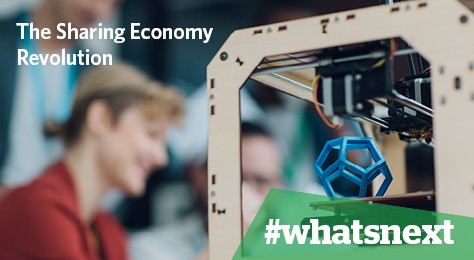CANADIAN IMMIGRATION UPDATES: Applicants to Master’s and Doctoral degrees are not affected by the recently announced cap on study permits. Read more

What’s Next: Marc-David Seidel on the sharing economy

To celebrate the University of British Columbia’s centennial, we asked UBC Sauder professors to tell us about imminent changes in business that will transform our daily lives. From the green economy to internet security we asked them, “What’s next?”
Who:
Marc-David Seidel, associate professor and director of the Maurice Young Entrepreneurship and Venture Capital Centre at the UBC Sauder School of Business. He worked in Internet development before the creation of the World Wide Web and launched several successful tech start-ups — including the first online airline portal.
What's now:
Sharing-based companies such as Airbnb and Uber have taken off, and are biting into the business of traditional players such as hotels and taxi companies.
But according to Seidel, they are just two of the hundreds of C-Form organizations that make up the rapidly expanding sharing economy, where communities of people can share everything from encyclopedic information (Wikipedia) to videos (YouTube) to cars (Car2Go) and even umbrellas at UBC (UmbraCity) — often more conveniently and at a significantly lower cost than traditional channels.
Seidel says the sudden explosion is no coincidence: it has come in tandem with tech advances such as smart phones that allow people to connect from nearly any locale.
“People can coordinate a lot more easily than they could before,” says Seidel, pointing to taxi companies that, in the past, had to rely on a centralized dispatch. “Consumers weren’t able to communicate directly with the drivers. But now you don’t need that centralized control anymore.”
Think about what comes next, and be the ones who create it rather having to react to it.
Marc-David Seidel, Associate Professor & Director of the W. Maurice Young Entrepreneurship & Venture Capital Centre, UBC Sauder School of Business
What's next:
Seidel predicts that more products and services will be shared — and organizations that are able to identify a need, then facilitate easy sharing, will thrive.
Transportation will see some of the biggest changes as shared driverless cars replace the need for both taxis and Uber drivers, and as drone technology makes product deliveries fast and simple.
Another major shift will come in manufacturing, where 3D printing technology and shared fabrication spaces will dramatically reduce the need for traditional large-scale manufacturing and shipping.
“You’ll be able to say, ‘I need a replacement door handle,’ get the file from the manufacturer or designer, then send it to a local shared fabrication space,” says Seidel, who points out that Mattel has already released a 3D printer that allows kids to manufacture their own toys. “Then it will be delivered by some sort of shared drone to your door.”
The nature of work will also change, predicts Seidel, and insurance and labour protections will be refined for workers in the sharing sector.
The biggest barriers will come from regulators and traditional businesses who want to control or limit the players; but those hurdles will be overcome in time, says Seidel. The market, he adds, will be far more open, and entrepreneurs will be able to get their products and services to a worldwide market without involving a major corporation.
“Particularly to the younger alumni, my biggest message is that it’s in their hands to envision what comes next, and don’t accept the current status quo,” he says. “Think about what comes next, and be the ones who create it rather than having to react to it.”